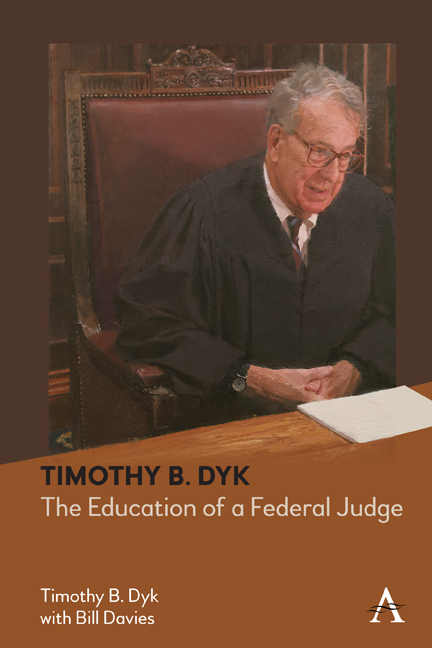Book contents
- Frontmatter
- Dedtication
- Contents
- Foreword
- Acknowledgments
- 1 Introduction
- 2 Family History
- 3 Early Life and Schooling, 1937–61
- 4 Clerking at the Supreme Court, 1961–63
- 5 The Tax Division, 1963–64
- 6 Wilmer Cutler, 1964–90
- 7 Jones Day, 1990–2000
- 8 Reflections on Changes in the Legal Profession
- 9 Becoming a Federal Judge, 1993–2000
- 10 The Confirmation Process, 1998–2000: Selected Diary Entries
- 11 Life as a Federal Judge, 2000–the Present
- 12 Epilogue
- Appendix
- Index
7 - Jones Day, 1990–2000
Published online by Cambridge University Press: 15 September 2022
- Frontmatter
- Dedtication
- Contents
- Foreword
- Acknowledgments
- 1 Introduction
- 2 Family History
- 3 Early Life and Schooling, 1937–61
- 4 Clerking at the Supreme Court, 1961–63
- 5 The Tax Division, 1963–64
- 6 Wilmer Cutler, 1964–90
- 7 Jones Day, 1990–2000
- 8 Reflections on Changes in the Legal Profession
- 9 Becoming a Federal Judge, 1993–2000
- 10 The Confirmation Process, 1998–2000: Selected Diary Entries
- 11 Life as a Federal Judge, 2000–the Present
- 12 Epilogue
- Appendix
- Index
Summary
Making the Switch
Wilmer Cutler's relationship with CBS and the broadcast business generally, which had been so important to me over the years, began to peter out in the mid-1980s. The reasons for this were several. The first factor was FCC deregulation (as a result of the election of President Ronald Reagan), which substantially eliminated the threat of license challenges and other FCC regulations. This meant less legal business defending against the FCC. There was also management turnover at CBS. Those who fostered the relationship with Wilmer Cutler left the company or were demoted to lesser positions and were replaced by others less favorably inclined. This process began as early as 1969 when Jack Schneider and Dick Jencks (the latter a strong supporter of the firm) were scheduled to assume the positions of CEO and president, replacing Paley and Stanton, only to find at the board meeting to finalize the scheduled change that Paley had changed his mind. Schneider reverted to president of the Broadcast Group, and Jencks became the Washington representative, with far less influence over the legal work. Stanton, a champion of broadcasters’ First Amendment rights, retired in 1973, pushed out by Paley. Paley's ultimate failing was his inability to turn the reins over to Stanton and, thereafter, his unwillingness to plan for an orderly succession. At his core, he did not want to surrender his role as CEO. After a series of designated replacements either died or were fired, the control of the company passed to the Tisch family in 1986 with unhappy consequences for the company.
Even before Tisch took over, the new CBS management decided that the FCC was no longer a threat, and CBS News needed to stand on its own. In other words, CBS did not need to have an impressive news service as a defense to license challengers and other FCC regulation. Cost cutting became the order of the day—cost cutting that extended to CBS News’ outside legal fees. As a result of this emphasis on profit and belt tightening, there was a drastic turnover in CBS personnel, and my friends in management at the company departed, the last being Ralph Goldberg.
- Type
- Chapter
- Information
- Timothy B. DykThe Education of a Federal Judge, pp. 115 - 134Publisher: Anthem PressPrint publication year: 2022

